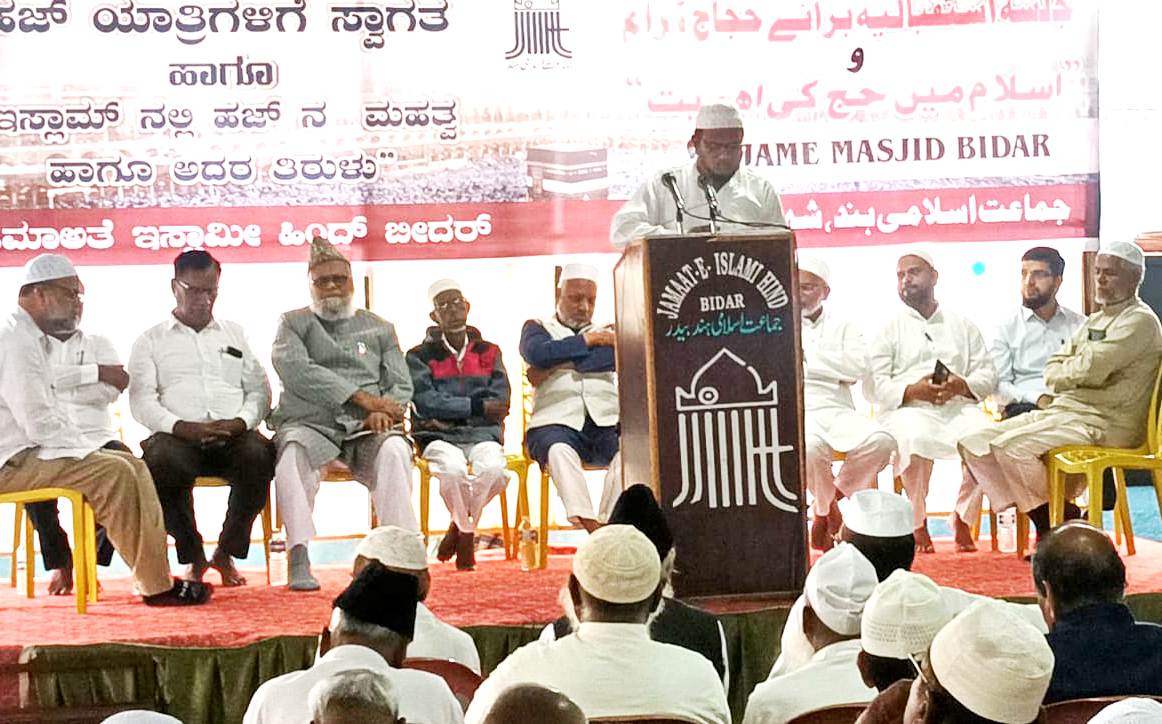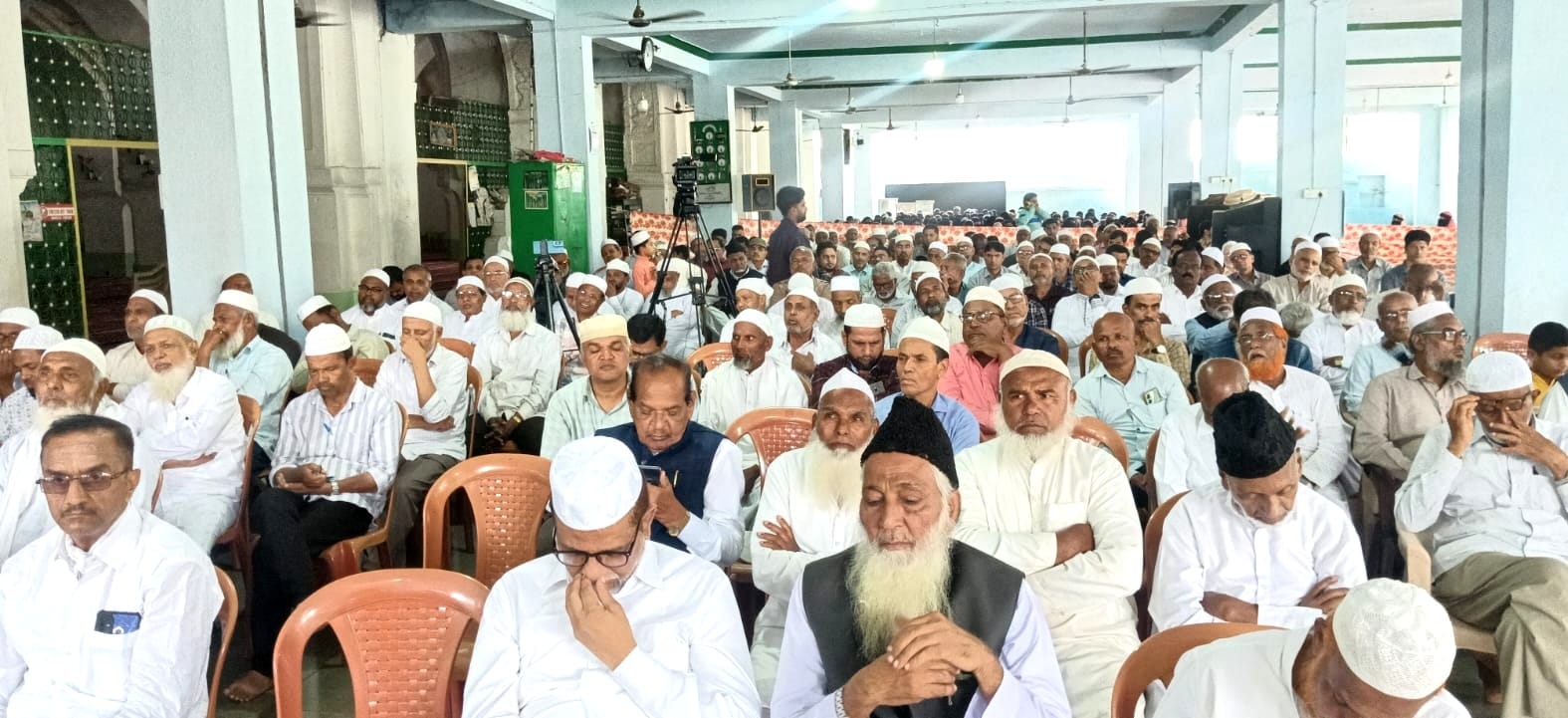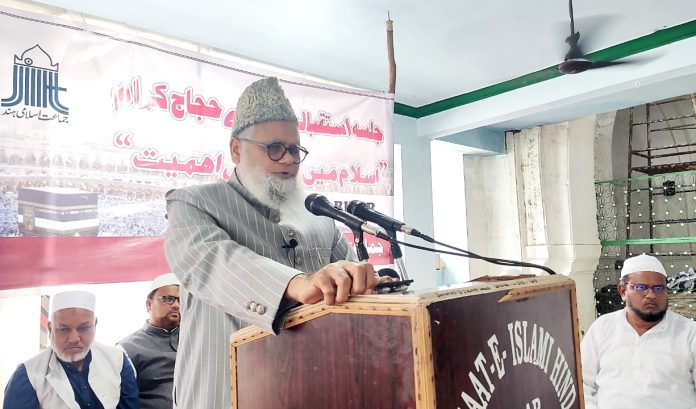– Mohammed Talha Siddi Bapa
Every year, the serene hallways of Bidar’s historic Juma Masjid echo with the memories of a sacred journey, as Jamaat-e-Islami Hind (JIH) Bidar organises its annual Haj Pilgrims’ Reception – not merely as a formality, but as a soulful reunion. More than a ceremonial gathering, the event serves as a space where returning pilgrims are welcomed with warmth and reverence, and invited to reflect upon the profound spiritual transformations they experienced during their days in the holy land.
 It is a moment of collective contemplation – for the pilgrims to recount their intimate encounters with the Divine, and for the community to witness and internalise the living spirit of Haj. By rekindling these narratives each year, JIH Bidar aspires to nurture a culture of God-consciousness, humility, and moral renewal. The programme, anchored in Islamic values and community spirit, offers both reflection and resolve – a reminder that the legacy of Haj does not end with the return journey, but begins anew in service, character, and truth.
It is a moment of collective contemplation – for the pilgrims to recount their intimate encounters with the Divine, and for the community to witness and internalise the living spirit of Haj. By rekindling these narratives each year, JIH Bidar aspires to nurture a culture of God-consciousness, humility, and moral renewal. The programme, anchored in Islamic values and community spirit, offers both reflection and resolve – a reminder that the legacy of Haj does not end with the return journey, but begins anew in service, character, and truth.
This year’s reception, held on Sunday at Juma Masjid, was marked by a spiritually charged atmosphere. The event drew not only this year’s Haj pilgrims but also many who had performed the pilgrimage in earlier years, seeking to rekindle their memories and renew their sense of devotion. Aspiring pilgrims came in search of guidance and inspiration. Even those who may never be able to undertake the sacred journey – due to age, means, or fate – came with hearts full of longing, simply to taste the spiritual fragrance of Haj through the words and presence of the pilgrims. The main prayer hall was filled to capacity, with men and women participating in this spiritual homecoming.
 Retired principal Mohammed Nizamuddin addressed the audience, describing Haj as “a supreme spiritual experience” and “an international convocation of monotheists.” He spoke of the Kaaba as a centre of divine guidance and prosperity, where circumambulation helps reorient one’s life around God.
Retired principal Mohammed Nizamuddin addressed the audience, describing Haj as “a supreme spiritual experience” and “an international convocation of monotheists.” He spoke of the Kaaba as a centre of divine guidance and prosperity, where circumambulation helps reorient one’s life around God.
He reminded the gathering that Qurbani (sacrifice) symbolises total submission to the Creator, and that Haj – as one of Islam’s five pillars – is an obligation upon every able Muslim. Quoting the Qur’an, he emphasised that it is a right Allah has upon the believer.
“Wearing two simple cloths, walking in sandals, spending nights in tents, and sleeping under the open sky – these are not just rituals but powerful lessons in humility and simplicity,” he said. “They bring us closer to our Creator and to one another.”
Elaborating on the stoning of the pillars, he explained it as a symbolic rejection of evil and recommitment to a righteous path. “In Arafat, the pilgrim weeps in repentance and resolves to avoid sin. And as the Prophet Muhammad ﷺ said, ‘Whoever performs Haj without obscenity or transgression returns as sinless as the day his mother gave birth to him.’”
He concluded by urging pilgrims to carry forward these spiritual gains into daily life. “This is where you have truly been – in the shadow of the Divine. Let that transformation reflect in your conduct, so that your Haj becomes a Haj-e-Mabroor – a Haj that is accepted by Allah.”
Presiding over the function, Hamed Mohammed Khan, Former president of Jamaat-e-Islami Hind Telangana, delivered a stirring address on the ideological and spiritual message of Haj. “The Haj pilgrim declares through every ritual that sovereignty belongs to Allah alone,” he said. “To accept His authority is to reject all other false gods – be they political, material, or ideological.”
Referring to Prophet Muhammad’s ﷺ Farewell Sermon, he emphasised the responsibility of Muslims to carry its timeless message forward. “We are not merely a community of rituals,” he declared. “We are witnesses to truth – a role that demands conviction, character, and courage.”
Hamed Khan stressed that Haj should not be seen as the conclusion of a spiritual journey, but the beginning of a new moral path. “A true pilgrim must return as a changed individual – a better human being, a more just neighbour, a more sincere servant of God.”
Several pilgrims took the stage to share their heartfelt reflections, describing emotional moments in Makkah and Madinah, the discipline of the rituals, and the indescribable peace of standing before the Kaaba. Their testimonies offered the audience not just information but inspiration – lived reminders of the transformative power of Haj.
The event opened with a welcome by Mohammed Mua’zzam, President of JIH Bidar City Unit, followed by a recitation of the Qur’an by Mohammed Sanawullah. Anchoring duties were carried out by Mohammed Arifuddin.
Among the dignitaries present were Juma Masjid President Mohammed Javid, Haj Committee Chairman Syed Sagir Ahmad, Syed Mansoor Ahmad Khadri, Mohammed Asifuddin, Gurunath Gadde, Mohammed Salahuddin, and Dr. Irshad Naveed.
As the evening concluded, it was evident that the Haj Pilgrims’ Reception was more than a tribute – it was a bridge. A bridge between past and present pilgrims, between spiritual memory and communal renewal. In a time of distraction and despair, such gatherings remind us that the path to Makkah may end with the return flight – but the path to God begins anew, in every step, in every heart, every single day.




